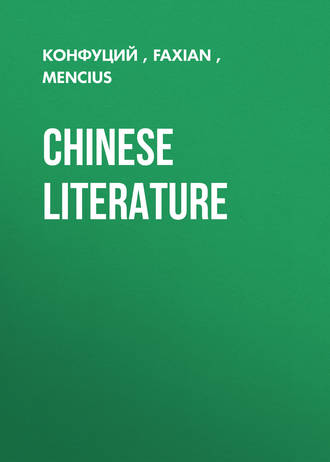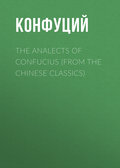
Конфуций
Chinese Literature
~ACT THIRD~
Enter Envoy, escorting the Princess, with a band of music.
PRINCESS. Thus was I, in spite of the treachery of Maouyenshow, who disfigured my portrait, seen and exalted by his Majesty; but the traitor presented a truer likeness to the Tartar king, who comes at the head of an army to demand me, with a threat of seizing the country. There is no remedy—I must be yielded up to propitiate the invaders! How shall I bear the rigors—the winds and frosts of that foreign land! It has been said of old, that "surpassing beauty is often coupled with an unhappy fate." Let me grieve, then, without entertaining fruitless resentment at the effects of my own attractions.
Enter Emperor, attended by his several officers.
EMPEROR. This day we take leave of the princess at Pahling bridge! [To his ministers. Can ye not devise a way to send out these foreign troops, without yielding up the princess for the sake of peace? [Descends from his horse and seems to grieve with Chaoukeun. Let our attendants delay awhile, till we have conferred the parting cup.
ENVOY. Lady, let us urge you to proceed on your way—the sky darkens, and night is coming on.
PRINCESS. Alas! when shall I again behold your Majesty? I will take off my robes of distinction and leave them behind me. To-day in the palace of Han—to-morrow I shall be espoused to a stranger. I cease to wear these splendid vestments—they shall no longer adorn my beauty in the eyes of men.
ENVOY. Again let us urge you, princess, to depart; we have delayed but too long already!
EMPEROR. 'Tis done!—Princess, when you are gone, let your thoughts forbear to dwell with sorrow and resentment upon us! [They part. ]And am I the great Monarch of the line of Han?
PRESIDENT. Let your Majesty cease to dwell with such grief upon this subject!
EMPEROR. She is gone! In vain have we maintained those armed heroes on the frontier.141 Mention but swords and spears, and they tremble at their hearts like a young deer. The princess has this day performed what belonged to themselvesand yet they affect the semblance of men!
PRESIDENT. Your Majesty is entreated to return to the palacedwell not so bitterly, Sir, on her memory:—allow her to depart!
EMPEROR. Did I not think of her, I had a heart of iron—a heart of iron! The tears of my grief stream in thousand channels—this evening shall her likeness be suspended in the palace, where I will sacrifice to it—and tapers with their silver lights shall illuminate her chamber.
PRESIDENT. Let your Majesty return to the palace—the princess
is already far distant! [Exeunt.
The Tartar Camp. Enter K'han at the head of his tribes, leading in the Princess.
K'HAN. The Emperor of Han having now, in observance of old treaties, yielded up to me the Lady Chaoukeun in marriage, I take her as my rightful queen. The two nations shall enjoy the benefits of peace. [To his generals Leaders, transmit my commands to the army to strike our encampment, and proceed to the north. [They march.
The river Amoor.142 Tartar army on its march.
PRINCESS. What place is this?
ENVOY. It is the River of the Black Dragon, the frontier of the Tartar territories and those of China. This southern shore is the Emperor's; on the northern side commences our Tartar dominion.
PRINCESS [to the K'han. Great King, I take a cup of wine, and pour a libation towards the South—my last farewell to the Emperor—[pours the libation of Han, this life is finished. I await thee in the next!
[Throws herself into the river. The K'han, in great consternation, endeavors to save her, but in vain.
K'HAN. Alas! alas!—so determined was her purpose against this foreign alliance—she has thrown herself into the stream, and perished! Tis done, and remediless! Let her sepulchre be on this river's bank, and be it called "the verdant tomb,"143 She is no more; and vain has been our enmity with the dynasty of Han! The traitor Maouyenshow was the author of all this misery. [To an officer Take Maouyenshow and let him be delivered over to the Emperor for punishment. I will return to our former friendship with the dynasty of Han. We will renew and long preserve the sentiments of relationship. The traitor disfigured the portrait to injure Chaoukeun—then deserted his sovereign, and stole over to me, whom he prevailed on to demand the lady in marriage. How little did I think that she would thus precipitate herself into the stream, and perish!—In vain did my spirit melt at the sight of her! But if I detained this profligate and traitorous rebel, he would certainly prove to us a root of misfortuneit is better to deliver him for his reward to the Emperor of Han, with whom I will renew, and long retain, our old feelings of friendship and amity. [Exeunt.
~ACT FOURTH~
Enter Emperor, with an attendant.
EMPEROR. Since the princess was yielded to the Tartars, we have not held an audience. The lonely silence of night but increases our melancholy! We take the picture of that fair one and suspend it here, as some small solace to our griefs, [To the attendant Keeper of the yellow gate, behold, the incense in yonder vase is burnt outhasten then to add some more. Though we cannot see her, we may at least retain this shadow; and, while life remains, betoken our regard. But oppressed and weary, we would fain take a little repose.
[Lies down to sleep. The Princess appears before him in a vision].144
PRINCESS. Delivered over as a captive to appease the barbarians, they would have conveyed me to their Northern countrybut I took an occasion to elude them and have escaped back. Is not this the Emperor, my sovereign? Sir, behold me again restored.
[A Tartar soldier appears in the vision].
SOLDIER. While I chanced to sleep, the lady, our captive, has made her escape, and returned home. In eager pursuit of her, I have reached the imperial palace.—Is not this she?
[Carries her off. The Emperor starts from his sleep].
EMPEROR. We just saw the Princess returned—but alas, how quickly has she vanished! In bright day she answered not to our call—but when morning dawned on our troubled sleep, a vision presented her in this spot. [Hears the wild fowl's145 cry Hark, the passing fowl screamed twice or thrice!—Can it know there is no one so desolate as I? [Cries repeated Perhaps worn out and weak, hungry and emaciated, they bewail at once the broad nets of the South and the tough bows of the North. [Cries repeated The screams of those water-birds but increase our melancholy.
ATTENDANT. Let your Majesty cease this sorrow, and have some regard to your sacred146 person.
EMPEROR. My sorrows are beyond control. Cease to upbraid this excess of feeling, since ye are all subject to the same. Yon doleful cry is not the note of the swallow on the carved rafters, nor the song of the variegated bird upon the blossoming tree. The princess has abandoned her home! Know ye in what place she grieves, listening like me to the screams of the wild bird?
Enter President.
PRESIDENT. This day after the close of the morning council, a foreign envoy appeared, bringing with him the fettered traitor Maouyenshow. He announces that the renegade, by deserting his allegiance, led to the breach of truce, and occasioned all these calamities. The princess is no more! and the K'han wishes for peace and friendship between the two nations. The envoy attends, with reverence, your imperial decision.
EMPEROR. Then strike off the traitor's head, and be it presented as an offering to the shade of the princess! Let a fit banquet be got ready for the envoy, preparatory to his return. [Recites these verses.
At the fall of the leaf, when the wild-fowl's cry was heard
in the recesses of the palace.
Sad dreams returned to our lonely pillow; we thought of
her through the night:
Her verdant tomb remains—but where shall we seek her
self?
The perfidious painter's head shall atone for the beauty
which he wronged.



